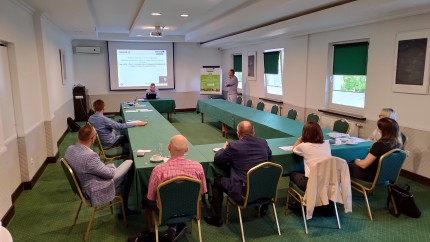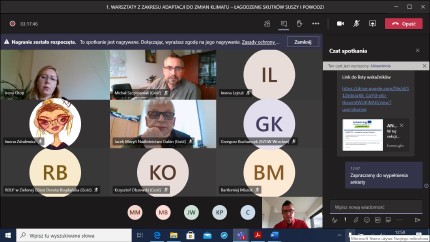Summary of the national Start-up Workshops
TEACHER-CE partners were organizing a series of Start-up workshops around the eight countries in the last three months. The project started in March 2020 and the main aim of the Start-Up workshops was to engage the relevant stakeholders in cooperation throughout the project.
The focus of the workshops
In the past few months, the key focus of the partnership was to develop a concept of the TEACHER-CE toolbox and workshops were a great opportunity to exchange views and comments with key stakeholders on the further development of the Toolbox. Workshops programs differed from country to country, but one common objective was to engage the stakeholders already at the beginning of the project, exchange ideas and expectations, discuss with them the main challenges in their daily operations and involve them in further developments of the project outputs.
In general, two main topics were discussed with stakeholders – a presentation of the project and status in the field of water management in adapting to climate change, and views and requirements for the concept of the Toolbox.
Stakeholder engagement
Almost 200 people participated at the workshops (physical or online - according to the relevant COVID19-situation in each country), representing all main project target groups (public authorities, sectoral agencies, NGOs, private sector, etc.). Most of them expressed their interest to be further involved and informed which is one of the ultimate goals of the project.
|
|

|

|
In order to assure that design of the Toolbox is supervised and guided by the key end-users, a special Focus Group was established. Key members of the Focus Group (37) in each country are Associated Partners and further key end users. They will help partners to obtain actionable insights on the Toolbox users’ needs and assure that the ownership for the project outputs is built already at the beginning of the project.
Outcomes of the workshops
There is a great awareness among the participants about the necessity to adapt the water management sector towards climate change. This awareness has been rising due to the increased frequency of extreme weather events in recent years.
The status of adaptation in water management to climate change differs by country and region. Several adaptation practices addressing water availability, flood protection, and forest management adaptation in water protection zones were pointed out. All stakeholders highlighted a contrast between general awareness of climate change impacts in different “water sectors” and among citizens and the weak response in terms of measures related to mitigation of and adaptation to climate change impacts.
Among the suggestions to increase climate change awareness and acceptance of adaptation measures, the following was emphasized by stakeholders: Implement concrete management strategies on both, policy and operative level; develop a holistic approach for management planning; target functional training to increase knowledge on the impact of climate change on water cycle and bridge the communication gap between scientists and land users; Increase awareness of ecosystem services (e.g. flood protection, water retention) and importance of functional ecosystems for maintenance of ecosystem services.
The focus of the discussion was to find out the demands and needs of stakeholders for the Toolbox. Stakeholders expressed their views regarding which functionalities should be included in the Toolbox to elaborate it as real support-tool for day-by-day and strategic activities. What was pointed out by the majority of stakeholders is that the tool needs to be functional, easy-to-use with a simplified user interface (web-based). Detailed instructions and links to pilot actions to learn more about the functionality of the tool. Also, a good description of the input data was requested and a necessity for including climate projections as well.
A tool designed to support climate change adaptation should have a cross-sectoral overview of the future projections of goals and measures and it should be developed in a way that it will support the practical side of adaptation tasks as efficiently as possible. For navigation purposes, it would be very good to have included a catalogue of national databases that are currently not interconnected (water, environment, nature, land registers, records, etc.).
The toolbox should contain basic knowledge, a directory of good practices, and dedicated climate change and risk/threat indicators for different planning units. There should be a function of searching (via GIS) for various aspects of a given problem.
Few participants raised the issue that in order for Toolbox to be used in practice it should be backed-up with legal documents, otherwise (personal and financial) resources will not be allocated.
Next steps
Feedbacks and suggestions for the Toolbox development will be forwarded to the partners who are working on the next phase of the Toolbox development. Meanwhile, communication and meetings with Focus Group members will continue in order to test and assure that main stakeholders’ requirements are integrated into the Toolbox.
Further intense communication will take place to support raise awareness-raising and bring the Toolbox into practice. In spring 2021 the next round of stakeholder events is planned, focusing on testing the first version of the Toolbox in pilot areas.
